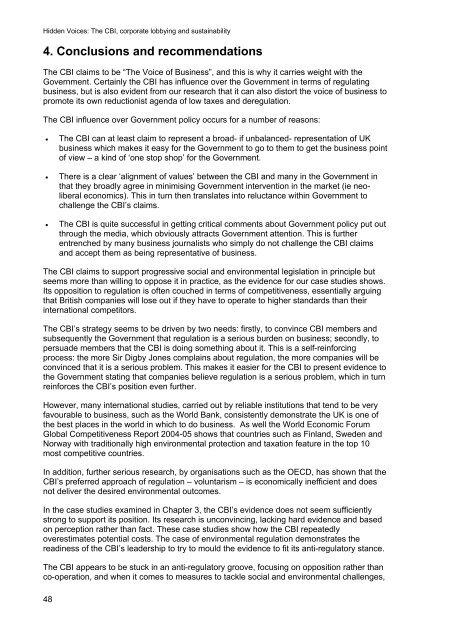hidden_voices
hidden_voices
hidden_voices
You also want an ePaper? Increase the reach of your titles
YUMPU automatically turns print PDFs into web optimized ePapers that Google loves.
Hidden Voices: The CBI, corporate lobbying and sustainability4. Conclusions and recommendationsThe CBI claims to be “The Voice of Business”, and this is why it carries weight with theGovernment. Certainly the CBI has influence over the Government in terms of regulatingbusiness, but is also evident from our research that it can also distort the voice of business topromote its own reductionist agenda of low taxes and deregulation.The CBI influence over Government policy occurs for a number of reasons:• The CBI can at least claim to represent a broad- if unbalanced- representation of UKbusiness which makes it easy for the Government to go to them to get the business pointof view – a kind of ‘one stop shop’ for the Government.• There is a clear ‘alignment of values’ between the CBI and many in the Government inthat they broadly agree in minimising Government intervention in the market (ie neoliberaleconomics). This in turn then translates into reluctance within Government tochallenge the CBI’s claims.• The CBI is quite successful in getting critical comments about Government policy put outthrough the media, which obviously attracts Government attention. This is furtherentrenched by many business journalists who simply do not challenge the CBI claimsand accept them as being representative of business.The CBI claims to support progressive social and environmental legislation in principle butseems more than willing to oppose it in practice, as the evidence for our case studies shows.Its opposition to regulation is often couched in terms of competitiveness, essentially arguingthat British companies will lose out if they have to operate to higher standards than theirinternational competitors.The CBI’s strategy seems to be driven by two needs: firstly, to convince CBI members andsubsequently the Government that regulation is a serious burden on business; secondly, topersuade members that the CBI is doing something about it. This is a self-reinforcingprocess: the more Sir Digby Jones complains about regulation, the more companies will beconvinced that it is a serious problem. This makes it easier for the CBI to present evidence tothe Government stating that companies believe regulation is a serious problem, which in turnreinforces the CBI’s position even further.However, many international studies, carried out by reliable institutions that tend to be veryfavourable to business, such as the World Bank, consistently demonstrate the UK is one ofthe best places in the world in which to do business. As well the World Economic ForumGlobal Competitiveness Report 2004-05 shows that countries such as Finland, Sweden andNorway with traditionally high environmental protection and taxation feature in the top 10most competitive countries.In addition, further serious research, by organisations such as the OECD, has shown that theCBI’s preferred approach of regulation – voluntarism – is economically inefficient and doesnot deliver the desired environmental outcomes.In the case studies examined in Chapter 3, the CBI’s evidence does not seem sufficientlystrong to support its position. Its research is unconvincing, lacking hard evidence and basedon perception rather than fact. These case studies show how the CBI repeatedlyoverestimates potential costs. The case of environmental regulation demonstrates thereadiness of the CBI’s leadership to try to mould the evidence to fit its anti-regulatory stance.The CBI appears to be stuck in an anti-regulatory groove, focusing on opposition rather thanco-operation, and when it comes to measures to tackle social and environmental challenges,48


